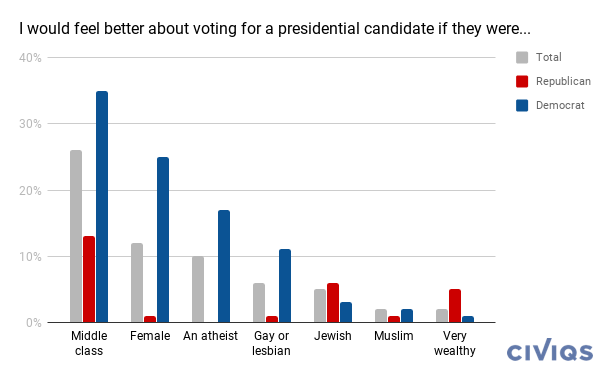Report: Three-quarters of Americans Believe that Foreign Governments will Attempt to Interfere in the 2020 Elections
The November 2019 Daily Kos/Civiqs Poll asked 1,560 registered voters in the United States about possible foreign interference in the 2020 elections, satisfaction with their health insurance, and voting for hypothetical presidential candidates.
Foreign interference in 2020
Nearly three-quarters (73%) of Americans believe that foreign governments will attempt to interfere in the 2020 elections. This view is shared across party lines, with 93% of Democrats, 70% of Independents, and 54% of Republicans. Even a majority of those who frequently watch Fox News (59%) believe that there will be attempts at election interference, as do 98% of those who frequently watch MSNBC.
Democrats and Republicans disagree about whether the Trump administration is doing enough to safeguard the 2020 elections. Democrats are the most concerned: 91% say that the Trump administration should be doing more. Most Republicans (60%) think that the current administration is doing enough already. Another 18% -- nearly one in five Republicans -- say that they are not concerned about the Trump administration’s response to foreign election interference, either way.
Health insurance satisfaction
Three-quarters (75%) of Americans are either very (39%) or somewhat (36%) satisfied with their current health insurance plan. Younger Americans are most likely to feel unsatisfied with their health insurance: only 63% of those age 18-34 were either very or somewhat satisfied. Americans over the age of 65 -- most of whom use Medicare -- are much more satisfied with their health insurance: 91% say they are either very (56%) or somewhat (35%) satisfied.
Among people with all types of insurance coverage, Americans receiving Medicare or Medicaid are the happiest with their current health insurance: 90% are either somewhat or very satisfied. By comparison, 77% of those with employer-provided insurance are somewhat or very satisfied, and 66% of those with privately-purchased insurance are somewhat or very satisfied.
Presidential Voting for Hypothetical 2020 Candidates
How would Americans’ voting preferences be affected if a presidential candidate was female, gay or lesbian, Muslim, Jewish, athiest, very wealthy, or middle class?
While the majority of Americans (79%) say that a presidential candidate being female would not affect their decision -- and 12% say that it would make them feel better about voting for the candidate -- one in ten Republicans (10%) say that they would not vote for a female presidential candidate at all. Conversely, 25% of Democrats say that voting for a female presidential candidate would make them feel better.

Nearly one in five Americans (18%), and 35% of Republicans, would not vote for a gay or lesbian presidential candidate. By race, 21% of whites would not vote for a gay or lesbian presidental candidate, compared to 12% of Blacks and 13% of Hispanic/Latino Americans. Whites are divided by education: 14% of white college graduates would not vote for a gay or lesbian presidential candidate, compared to 24% of whites without a college degree.
Americans are deeply divided in their response to a presidential candidate who is an atheist. A quarter of Americans (26%) would not vote for a presidential candidate if they were an atheist: 8% of Democrats, 25% of Independents, and 49% of Republicans. However, one in ten Americans (10%) would feel better voting for an atheist presidential candidate. Younger Americans feel better about voting for an atheist candidate (20%); and older Americans are more likely to say that they would not vote for an athiest (32%).
Nearly a third of Americans (32%) would not vote for a presidential candidate if they were a Muslim. This includes 65% of Republicans, 30% of Independents, but only 7% of Democrats. Nearly half of whites without a college degree would not vote for a Muslim candidate (42%), versus 27% of college-educated whites.
There is a deep partisan split in preferences towards voting for wealthy or middle-class candidates. Two-thirds of Americans (67%) say that if a presidential candidate were very wealthy, it would not affect their decision, and 17% say that it would bother them. However, 27% of Democrats would be troubled to vote for a wealthy presidential candidate. In contrast, no Republicans said that they would reject a presidential candidate on the basis of their wealth. Overall, 26% of Americans would feel better voting for a middle-class presidential candidate, the highest percentage that would feel better voting for a candidate solely based on a single personal characteristic.

Civiqs surveyed 1,560 registered voters in the United States from November 9-13, 2019. The survey was conducted online, among selected members of the Civiqs research panel. Sampled individuals were emailed by Civiqs and responded using a personalized link to the survey at civiqs.com. The survey results are weighted by age, race, gender, education, party identification, and region to be representative of the population of registered voters in the United States. The general design effect due to weighting is 1.14. The survey has a margin of error of ±2.6% at the 95% confidence level, accounting for the design effect.
Download the survey methodology and crosstabs
Interested in conducting a survey? Speak with a Civiqs Analyst.
Want Civiqs updates in your inbox? Sign up for our newsletter, Immediate Reaction.